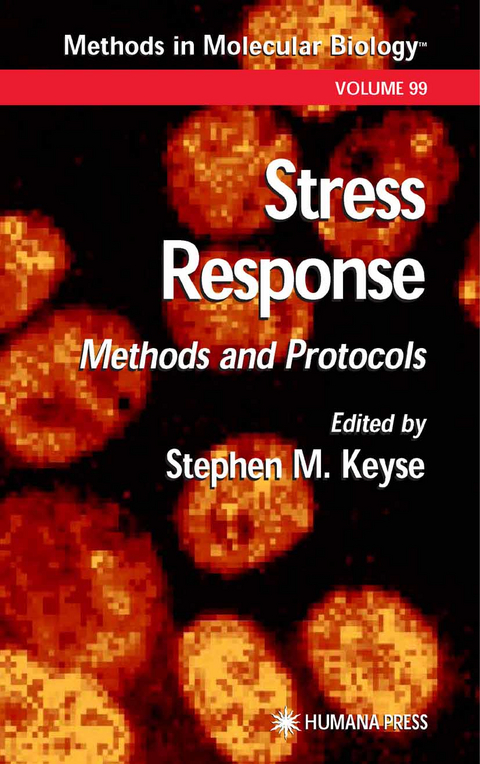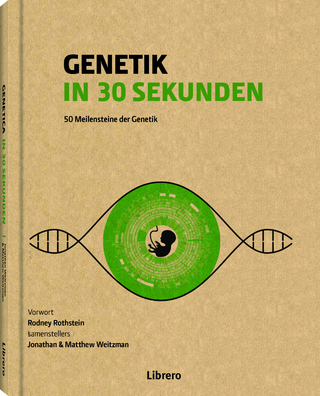
Stress Response
Humana Press Inc. (Verlag)
978-0-89603-611-6 (ISBN)
Detection and Assay of Stress-Induced Damage.- Identifying and Counting Protein Modifications Triggered by Nitrosative Stress.- Determination of Carbonyl Groups in Oxidized Proteins.- Quantitation of 4-Hydroxynonenal Protein Adducts.- Detection of Oxidative Stress in Lymphocytes Using Dichlorodihydrofluorescein Diacetate.- The Measurement of Protein Degradation in Response to Oxidative Stress.- The Activation of Signal Transduction by Cellular Stress.- Analysis of the Role of the AMP-Activated Protein Kinase in the Response to Cellular Stress.- Detection and Activation of Stress-Responsive Tyrosine Kinases.- Detection of DNA-Dependent Protein Kinase in Extracts from Human and Rodent Cells.- Expression and Assay of Recombinant ATM.- Detection and Purification of a Multiprotein Kinase Complex from Mammalian Cells.- Methods to Assay Stress-Activated Protein Kinases.- Monitoring the Activation of Stress-Activated Protein Kinases Using GAL4 Fusion Transactivators.- Use of Kinase Inhibitors to Dissect Signaling Pathways.- The Development and Use of Phospho-Specific Antibodies to Study Protein Phosphorylation.- Peptide Assay of Protein Kinases and Use of Variant Peptides to Determine Recognition Motifs.- The Analysis of Stress-Induced Gene Expression.- Assaying NF-KB and AP-1 DNA-Binding and Transcriptional Activity.- Analysis of the Mammalian Heat-Shock Response.- Approaches to Define the Involvement of Reactive Oxygen Species and Iron in Ultraviolet-A Inducible Gene Expression.- The Human Immunodeficiency Virus LTR-Promoter Region as a Reporter of Stress-Induced Gene Expression.- Sage: The Serial Analysis of Gene Expression.- Analysis of Differential Gene Expression Using the SABRE Enrichment Protocol.- UVB-Regulated Gene Expression in Human Keratinocytes.- Analysis of Stress Protein Function.- Heme Oxygenase Activity Current Methods and Applications.- Analysis of Molecular Chaperone Activities Using In Vitro and In Vivo Approaches.- Analysis of Chaperone Properties of Small Hsp’.- Analysis of Small Hsp Phosphorylation.- Analysis of Multisite Phosphorylation of the p53 Tumor-Suppressor Protein byTryptic Phosphopeptide Mappin.- Development of Physiological Models to Study Stress Protein Responses.
"This handbook will be very helpful in this respect for everybody interested in studies on the effects of stress at the cellular level using biochemical and molecular biology methods." -Cell Biology International
| Erscheint lt. Verlag | 19.5.2000 |
|---|---|
| Reihe/Serie | Methods in Molecular Biology ; 99 |
| Zusatzinfo | XVI, 488 p. |
| Verlagsort | Totowa, NJ |
| Sprache | englisch |
| Maße | 155 x 235 mm |
| Themenwelt | Naturwissenschaften ► Biologie ► Genetik / Molekularbiologie |
| Naturwissenschaften ► Biologie ► Mikrobiologie / Immunologie | |
| Naturwissenschaften ► Biologie ► Zellbiologie | |
| ISBN-10 | 0-89603-611-1 / 0896036111 |
| ISBN-13 | 978-0-89603-611-6 / 9780896036116 |
| Zustand | Neuware |
| Haben Sie eine Frage zum Produkt? |
aus dem Bereich


